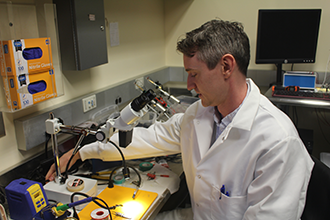
Advancing Treatment for Pediatric Craniopharyngioma: A Prospective Pilot Study Identifying Clinically Relevant Biological Targets for Medical Therapy
This 36-month, multicenter pilot study headed by the University of Colorado Anschutz Medical Campus (UCAMC) includes member institutions of the Pediatric Oncology Experimental Therapeutics Investigators' Consortium (POETIC) as well as selected additional sites. Samples of snap-frozen pediatric adamantinomatous craniopharyngioma are sent to the UCAMC to be analyzed using advanced biological techniques, while Weill Cornell Medicine researchers concomitantly collect clinical data to correlate with the biological characteristics of each subject's tumor tissue. Due to the unique quality-of-life burden that adamantinomatous craniopharyngioma imposes, the UCAMC pilots an electronic method for the assessment of short-term academic and behavioral outcomes of these patients.
This project will inform the design of a subsequent clinical trial of a medical antitumor therapy as well as establish a multicenter working group for the ongoing study of children with adamantinomatous craniopharyngioma.
Contact
Mark Souweidane: (212) 746-2363
Computerized Tomography (CT) Angiography of the Enucleated Eye in Children With Bilateral Retinoblastoma
Patients with retinoblastoma are currently treated by injecting a small amount of chemotherapeutic fluid directly into the ophthalmic artery (a process referred to as Ophthalmic Artery Chemosurgery [OAC]). In some patients with bilateral disease, despite conventional therapy, one eye has previously been enucleated due to uncontrolled disease. In patients currently undergoing OAC for treatment purposes, we plan to use CT angiography in the contralateral ophthalmic artery (in the previously enucleated orbit) to describe changes in orbital vasculature following enucleation.
Contact
Pierre Gobin: (212) 746-4998
Harvesting of Excess Bone Marrow for the Collection of Human Mesenchymal Stem Cells
This study enables researchers to use excess bone marrow taken during spinal fusion surgeries to isolate human mesenchymal stem cells for use in tissue-engineered constructs.
Contact
(212) 746-2152
Neurological Surgery Patient Registry
This registry tracks the quality of surgical care for the most common neurosurgical procedures and provides an immediate infrastructure for analyzing and reporting the quality of neurosurgical care, including risk-adjusted benchmarks (i.e., quality assessment and improvement).
Contact
Philip Stieg: (212) 746-4684
Nonoperative Management of Suspected Eosinophilic Granuloma (EG) of the Skull
This study enables evaluation of the outcomes of children with probable isolated calvarial EG managed with an initial protocol of only observation.
Contact
Mark Souweidane: (212) 746-2363
Registry of Retinoblastoma Patients Receiving Intra-Arterial Chemotherapy
This study tracks the use of intra-arterial chemotherapy for retinoblastoma (a cancer of the eye in young children). Drs. Pierre Gobin, director of interventional radiology at Weill Cornell Medicine, and David Abramson, chief of ophthalmic oncology at Memorial Sloan Kettering, pioneered this intra-arterial chemotherapy technique in 2006 as an alternative to enucleation (removal of the eye) in cases of advanced cancers. The procedure has now been performed more than 750 times to treat more than 220 eyes (each eye receives multiple treatments). Intra-arterial chemotherapy saves approximately 80 percent of eyes in children who are referred immediately with no prior treatment, and 50 percent of eyes in children who have undergone failed prior treatments at other institutions.
For this registry, the effect of each intra-arterial chemotherapy procedure is judged at an eye examination performed after four weeks. This examination is repeated if appropriate, for an average of 3.4 sessions.
Contact
Pierre Gobin: (212) 746-4998
Research for Precision Medicine in Pediatric Oncology
Our researchers sequence advanced and metastatic tumor data in order to support the pediatric oncology community with precision medicine findings. The underlying scientific focus of this study is the genetic makeup of pediatric tumors and how this relates to prognosis, treatment and outcome.
Contact
Jeffrey Greenfield: (212) 746-2363
Using Genomic Analysis to Guide Individualized Treatment for Glioblastoma Multiforme (GBM)
Weill Cornell Medicine researchers use genomic sequencing data to guide personalized treatment options for GBM patients. The identification of tumor cell changes over the course of this study will guide our doctors who decide what treatments are best for a patient’s specific type of tumor.
Contact
Mark Souweidane: (212) 746-2363

